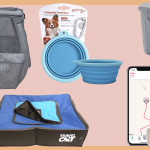Imagine never having to worry about your dog’s potty time again. No more rushing home from work, no more late-night walks in the rain. With the best dog litter box, you can provide a convenient and hygienic solution for your furry friend’s bathroom needs. Whether you live in an apartment or have limited outdoor space, these innovative pet care products offer a practical alternative to traditional potty training methods. In this article, we will explore the different options available and help you choose the best dog litter box that suits your needs and your dog’s preferences. Say goodbye to accidents and hello to hassle-free potty time with your beloved four-legged companion.
Factors to Consider
Size
When choosing a dog litter box, considering the size is essential. You want to make sure that the box is spacious enough for your dog to comfortably use. Dogs come in different sizes, so it’s crucial to select a litter box that matches your dog’s size. A small box may cause discomfort, while a large box may be overwhelming for a small dog. Additionally, you should also take into account the available space in your home to ensure the litter box fits well in your designated area.
Material
The material of the dog litter box is another factor to consider. Different materials offer various benefits, so it’s essential to choose one that suits your needs. Plastic litter boxes are lightweight, durable, and easy to clean. Metal boxes are sturdy and can withstand heavy use. Wood litter boxes provide a more aesthetic appeal and can blend well with your home decor. Additionally, there are alternative materials, such as eco-friendly options, that cater to those looking for more sustainable choices. Consider your preferences and the needs of your dog when selecting the material.
Design
The design of the dog litter box is an important factor to think about. It encompasses various aspects, including the entry point design, the presence of a privacy cover, the shape, and layout. The entry point design should be accessible for your dog to enter easily. Some litter boxes have a low entry point, while others have a higher entry point for dogs with mobility issues. A privacy cover can provide a sense of privacy for your dog while doing their business. The shape and layout of the litter box should be convenient for your dog to move around and turn comfortably. Consider your dog’s preferences and behavior when choosing a design.
Odor Control
Odor control is a significant factor to consider when selecting a dog litter box. Nobody wants their home to smell unpleasant due to the dog’s waste. Look for litter boxes with features that help control odor. Some litter boxes use absorbent materials that trap odors effectively. Carbon filters can also be used to neutralize smells. Scented litter can help mask unpleasant odors, although some dogs may be sensitive to the fragrance. Liner bags can also aid in odor control by providing an easy and hygienic way to dispose of the waste. Consider the odor control features that best suit your needs and preferences.
Ease of Cleaning
Cleaning a dog litter box is a regular task, so choosing one that is easy to clean is essential. Look for litter boxes with a removable tray or bottom panel for effortless cleaning. This allows you to easily dispose of the waste and sanitize the box. Non-stick coating can prevent waste from sticking to the surface, making cleaning more efficient. Some litter boxes even have a self-cleaning mechanism that automatically removes waste, saving you time and effort. Additionally, consider if the litter box is compatible with a litter scoop, which can help in removing any solid waste more easily. Prioritize convenience and hygiene when selecting a litter box with ease of cleaning in mind.

Types of Dog Litter Boxes
Open Tray
An open tray litter box features a simple design, making it easy for dogs to access. It is typically a shallow tray that allows dogs to step in and do their business. Open tray litter boxes provide easy visibility for monitoring the level of litter and waste. However, they offer limited odor control compared to other types of litter boxes. Since there are no covers or filters, the odor may spread in the surrounding area. Additionally, open tray litter boxes require more frequent cleaning due to the lack of a cover to contain the litter. If you prioritize simplicity and easy access for your dog, an open tray litter box may be a suitable choice.
Top-Entry Box
A top-entry box is designed with a top entrance, providing some unique advantages. It helps to reduce litter scatter, as dogs need to jump in and out of the box, minimizing the amount of litter that may get tracked around the house. The top-entry design also offers privacy, making it a preferred option for dogs who prefer a bit more seclusion while doing their business. However, it may not be ideal for elderly or disabled dogs who may find it challenging to climb in and out of the box. Additionally, for larger dogs, the top-entry box may not offer enough space for them to move comfortably. Consider your dog’s physical abilities and preferences before choosing a top-entry box.
Enclosed Box
An enclosed litter box provides a more private and secluded space for your dog’s bathroom needs. It typically features a cover or hood that helps contain odors and keeps the litter neatly enclosed. The enclosed design also helps to prevent litter scatter, ensuring a cleaner surrounding area. However, some dogs may feel confined or restricted in an enclosed box, especially if they prefer more open spaces. It’s important to introduce your dog to the enclosed box gradually and monitor their comfort level. Some enclosed boxes also have an opening or a flap for easy entry and exit. If your dog prefers privacy and you want to minimize litter scatter and odor, an enclosed box may be a suitable choice.
Disposable Box
A disposable litter box offers convenience and easy maintenance. These boxes are made of biodegradable materials, allowing you to dispose of the entire box when necessary. They are often pre-filled with litter, saving you the hassle of refilling and cleaning the litter box. Disposable boxes are particularly useful when traveling or during temporary situations. However, since they are meant for single-use, they may not be the most cost-effective option for long-term use. If you prioritize convenience and prefer not to clean or refill a litter box regularly, a disposable box can be a suitable choice.
Automatic Box
An automatic litter box is a high-tech option that offers low maintenance and efficient cleaning. These boxes typically have sensors that detect when the dog has finished using the box. They then automatically rake and remove the waste, keeping the litter clean. The automatic cleaning mechanism saves you time and effort, making it a popular choice for busy pet owners. However, automatic boxes tend to be more expensive compared to other types of litter boxes. Additionally, some dogs may be startled by the noise or movement of the automatic cleaning process. If you value convenience and are willing to invest in a premium option, an automatic box may be worth considering.
In conclusion, when choosing a dog litter box, factors such as size, material, design, odor control, and ease of cleaning should all be taken into consideration. Each type of litter box, including open tray, top-entry, enclosed, disposable, and automatic boxes, has its own advantages and considerations. Assess your dog’s needs and preferences, as well as your own lifestyle, to determine the best dog litter box for you. Remember, a well-suited litter box can contribute to your dog’s comfort and hygiene, promoting a clean and pleasant environment for both you and your furry friend.






